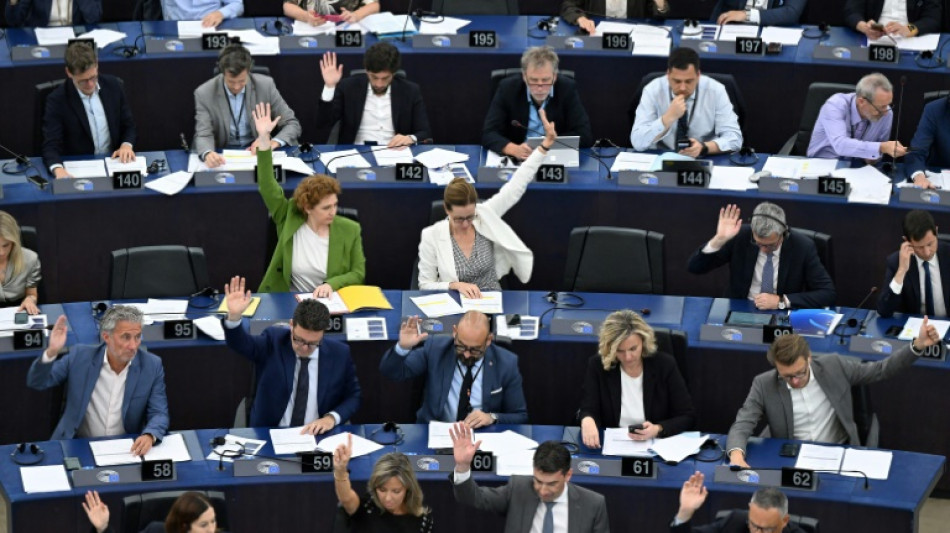
-
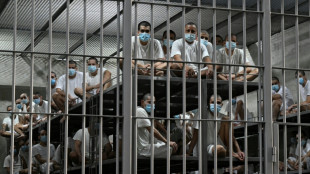 Gang members given hundreds-years-long sentences in El Salvador
Gang members given hundreds-years-long sentences in El Salvador
-
Chargers, Bills edge closer to playoff berths

-
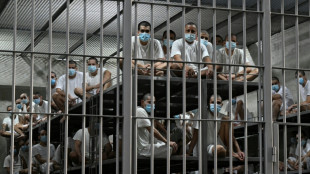 Gang members given hundred-years-long sentences in El Salvador
Gang members given hundred-years-long sentences in El Salvador
-
Hosts Morocco off to winning start at Africa Cup of Nations

-
 No jacket required for Emery as Villa dream of title glory
No jacket required for Emery as Villa dream of title glory
-
Amorim fears United captain Fernandes will be out 'a while'

-
 Nigerian government frees 130 kidnapped Catholic schoolchildren
Nigerian government frees 130 kidnapped Catholic schoolchildren
-
Captain Kane helps undermanned Bayern go nine clear in Bundesliga

-
 Captain Kane helps undermanned Bayern go nine clear
Captain Kane helps undermanned Bayern go nine clear
-
Rogers stars as Villa beat Man Utd to boost title bid

-
 Barca strengthen Liga lead at Villarreal, Atletico go third
Barca strengthen Liga lead at Villarreal, Atletico go third
-
Third 'Avatar' film soars to top in N. American box office debut

-
 Third day of Ukraine settlement talks to begin in Miami
Third day of Ukraine settlement talks to begin in Miami
-
Barcelona's Raphinha, Yamal strike in Villarreal win

-
 Macron, on UAE visit, announces new French aircraft carrier
Macron, on UAE visit, announces new French aircraft carrier
-
Barca's Raphinha, Yamal strike in Villarreal win

-
 Gunmen kill 9, wound 10 in South Africa bar attack
Gunmen kill 9, wound 10 in South Africa bar attack
-
Allegations of new cover-up over Epstein files

-
 Atletico go third with comfortable win at Girona
Atletico go third with comfortable win at Girona
-
Schwarz breaks World Cup duck with Alta Badia giant slalom victory

-
 Salah unaffected by Liverpool turmoil ahead of AFCON opener - Egypt coach
Salah unaffected by Liverpool turmoil ahead of AFCON opener - Egypt coach
-
Goggia eases her pain with World Cup super-G win as Vonn takes third

-
 Goggia wins World Cup super-G as Vonn takes third
Goggia wins World Cup super-G as Vonn takes third
-
Cambodia says Thai border clashes displace over half a million

-
 Kremlin denies three-way US-Ukraine-Russia talks in preparation
Kremlin denies three-way US-Ukraine-Russia talks in preparation
-
Williamson says 'series by series' call on New Zealand Test future

-
 Taiwan police rule out 'terrorism' in metro stabbing
Taiwan police rule out 'terrorism' in metro stabbing
-
Australia falls silent, lights candles for Bondi Beach shooting victims

-
 DR Congo's amputees bear scars of years of conflict
DR Congo's amputees bear scars of years of conflict
-
Venison butts beef off menus at UK venues

-
 Cummins, Lyon doubts for Melbourne after 'hugely satsfying' Ashes
Cummins, Lyon doubts for Melbourne after 'hugely satsfying' Ashes
-
'It sucks': Stokes vows England will bounce back after losing Ashes

-
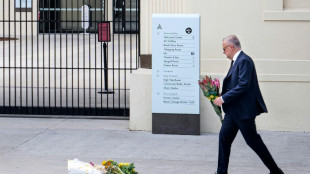 Australia probes security services after Bondi Beach attack
Australia probes security services after Bondi Beach attack
-
West Indies need 462 to win after Conway's historic century

-
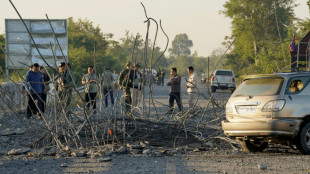 Thai border clashes displace over half a million in Cambodia
Thai border clashes displace over half a million in Cambodia
-
Australia beat England by 82 runs to win third Test and retain Ashes

-
 China's rare earths El Dorado gives strategic edge
China's rare earths El Dorado gives strategic edge
-
Japan footballer 'King Kazu' to play on at the age of 58

-
 New Zealand's Conway joins elite club with century, double ton in same Test
New Zealand's Conway joins elite club with century, double ton in same Test
-
Australian PM orders police, intelligence review after Bondi attack
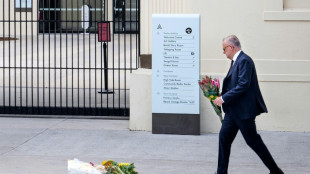
-
 Durant shines as Rockets avenge Nuggets loss
Durant shines as Rockets avenge Nuggets loss
-
Pressure on Morocco to deliver as Africa Cup of Nations kicks off

-
 Australia remove Smith as England still need 126 to keep Ashes alive
Australia remove Smith as England still need 126 to keep Ashes alive
-
Myanmar mystics divine future after ill-augured election

-
 From the Andes to Darfur: Colombians lured to Sudan's killing fields
From the Andes to Darfur: Colombians lured to Sudan's killing fields
-
Eagles win division as Commanders clash descends into brawl

-
 US again seizes oil tanker off coast of Venezuela
US again seizes oil tanker off coast of Venezuela
-
New Zealand 35-0, lead by 190, after racing through West Indies tail

-
 How Can Gum Disease Lead to Tooth Loss in Kyle, TX?
How Can Gum Disease Lead to Tooth Loss in Kyle, TX?
-
West Indies 420 all out to trail New Zealand by 155


EU moves one step closer towards 'historic' AI rules
EU lawmakers pushed the bloc Wednesday closer to passing one of the world's first laws regulating artificial intelligence systems like ChatGPT, by backing a key text that forms the basis of a future law.
While the European Union first proposed such a law in 2021, the draft rules took on greater urgency when ChatGPT exploded onto the scene last year, showing off AI's dizzying advances and possible risks.
The EU says its law, once passed, will set the "global standard", but the bloc could face pushback from big tech companies.
US-based OpenAI, which created ChatGPT, has already warned that depending on the content of the law it could be forced to withdraw from the EU.
While AI proponents hail the technology for how it will transform society, including work, healthcare and creative pursuits, others are worried by its potential to undermine democracy.
There have been a slew of awe-inspiring examples of AI's uses including a "final Beatles record" created using the technology, while ChatGPT has passed business, law and medical exams.
After months of heated discussions between lawmakers to support a compromise text, MEPs voted overwhelmingly to kickstart negotiations with the EU's 27 member countries and talks were to start later Wednesday.
The EU insists the law will foster AI innovation while also protecting against dangers the technology poses to people.
Brussels is particularly concerned by deepfakes -- AI-generated images and audio that can be stunningly lifelike -- and how the technology can be used for disinformation, less than a year before European-wide elections.
- 'Balanced' approach -
The law would regulate AI according to the level of risk: the higher the risk to individuals' rights or health, for example, the greater the systems' obligations.
Brussels wants the final law to be approved by the end of the year.
Even if that ambitious target is achieved, the law would not come into force until 2026 at the earliest, forcing the EU to push for a voluntary interim pact with tech companies.
The parliament's text differs from that proposed by the European Commission, the EU's executive arm, in 2021.
Lawmakers proposed bans on AI systems that use biometric surveillance including live use of facial recognition and so-called predictive policing.
But the commission wants to allow such technology to be used in exceptional circumstances by security forces against crime and terrorism.
Commission Vice President Margrethe Vestager noted the parliament's approach and how it is pitted against "a slightly more pragmatic or security-oriented approach".
The text also calls for special requirements on generative AI systems -- those such as ChatGPT and DALL-E capable of producing text, images, code, audio and other media -- that include informing users that a machine, not a human, produced the content.
As member states and the parliament thrash out a deal in the coming months, officials said the bans and generative AI will dominate talks.
The legislation builds on the EU's already formidable legal arsenal against technology companies, which includes two major laws to ensure social media platforms follow the bloc's rules.
The EU's proposed high-risk list includes AI in critical infrastructure, education, human resources, public order and migration management.
The parliament added extra conditions before the high-risk classification could be met, including the potential to harm people's health, safety, rights or the environment.
That has not been welcomed by everyone.
The CCIA, a European industry lobby group representing major tech companies, warned some of the MEPs' changes "are likely to overburden European AI developers with excessively prescriptive rules, ultimately slowing down innovation".
There is also growing clamour to regulate AI across the Atlantic, although Washington is vastly behind the EU in terms of developing such rules.
"We have made history today," Brando Benifei, one of the EU lawmakers spearheading the draft law through parliament, said on Wednesday.
Lawmakers, he said, had defined the dialogue the EU is having with the rest of the world to regulate AI.
L.Harper--AMWN



